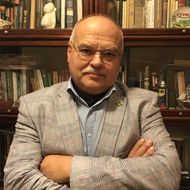- A
- A
- A
- ABC
- ABC
- ABC
- А
- А
- А
- А
- А
- HSE Campus in St. Petersburg
- Institute of Asian and African Studies
- News
- Institute of Asian and African Studies develops scientific cooperation with Tashkent State University of Oriental Studies
-
Institute
- About the Institute
- Faculty and Staff
-
Departments
-
- Department of Middle Eastern and African Studies
- Department for Chinese, South and Southeast Asian Studies
- Department of Japanese Studies
- Department of Korean Studies
- Department of International Relations and Political Processes in Asia and Africa
- Department of Public and Cultural Development in Asia and Africa
-
- Degree Programmes
190121, Saint Petersburg,
Soyuza Pechatnikov str., 16
The Institute of Asian and African Studies was established in 2022 at HSE University-St Petersburg based on the Department of Asian and African Studies, the undergraduate and graduate programmes in the related field, as well as the Centre for Asian and African Studies. The Institute focuses on the development of professional education along with Asian and African studies as a field of scientific knowledge, aiming to preserve and enhance the achievements of the St Petersburg school of Oriental Studies.
Asian and African Studies
Cross-Cultural Studies of Asia and Africa in the Context of International Relations
 EU–Central Asian Interactions: Perceptions, Interests and Practices
EU–Central Asian Interactions: Perceptions, Interests and Practices
Arynov Z., Bossuyt F., Davletova N. et al.
Abingdon: Routledge, 2024.
Journal of Current Chinese Affairs. 2025. Vol. 54. No. 1. P. 25-47.
In bk.: EU–Central Asian Interactions: Perceptions, Interests and Practices. Abingdon: Routledge, 2024. Ch. 6.
Krivokhizh S., Akopov S.
Basic research program. WP BRP. National Research University Higher School of Economics, 2019. No. 65/PS/2019 .
190121, Saint Petersburg,
Soyuza Pechatnikov str., 16

Institute of Asian and African Studies develops scientific cooperation with Tashkent State University of Oriental Studies

During the meeting with Gulchehra Rikhsieva, Rector of TSUOS, they discussed the creation of ‘mirror laboratories’ for the implementation of artificial intelligence methods in various areas of Asian and African studies, as well as priority areas of scientific cooperation. The main project being developed by the two Asian Studies centres is the study of soft power strategies of non-Western countries.
Maria Soloshcheva and Elena Soboleva visited the Confucius Institute on the basis of TSUOS, which was established as one of the first in the world in 2004. During the meeting, Saodat Nasirova, the director of the Institute on the Uzbek side, introduced the organization and work of the Confucius Institute at TSUOS. Parties shared the experience of teaching Chinese language and culture, as well as discussed possible formats of cooperation between the specialists in Chinese language and culture of the two universities.
The main event of the visit was the scientific seminar ‘Theoretical and methodological approaches to the study of soft power of non-Western countries’. Elena Soboleva, Evgeny Zelenev, and Maria Soloscheva made presentations. From the Uzbek side, the seminar was attended by Professor Kakhramon Hakberdiev, Associate Professors Sukhrob Buronov, Rovshan Goziev and Akiliddin Alimov.
In the course of negotiations with representatives of TSUOS faculties, it was decided to organize online seminars on the use of artificial intelligence technologies in the educational process.
-
https://elearning.hse.ru/en/mooc/
Massive Open Online Courses
-
https://www.hse.ru/en/visual/
HSE Site for the Visually Impaired
-
http://5top100.com/
Russian Academic Excellence Project 5-100
- © HSE University 1993–2025 Contacts Copyright Privacy Policy Site Map
- Edit
